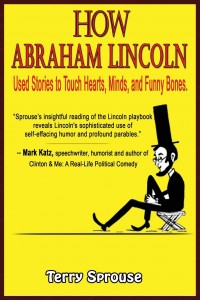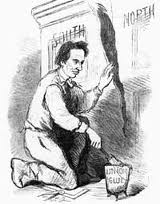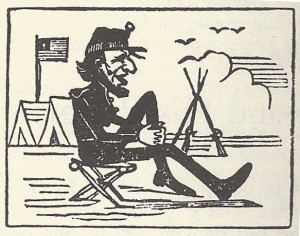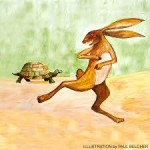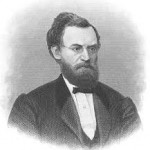How Abraham Lincoln Used Stories to Touch Hearts, Minds & Funny Bones
“I am Terry Sprouse and I am a Lincoln-holic.”
But, let’s go back to where it all began.
I first became acquainted with Abraham Lincoln when I was a Peace Corps Volunteer in Honduras in 1986. Like most PCVs, I was starved for any reading material that was written in English, a thing more valuable to me than diamonds.
A Life Changing Book
One day, I received a large package from my mother. It was book entitled “Abraham Lincoln – One volume edition” by Carl Sandburg.
I was captivated by the personality of Lincoln, as well as the elegant manner in which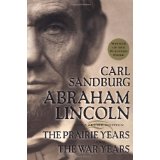 the book was written. As I read the book, I felt like I was experiencing a beautiful dream that I never wanted to end. I read the book through many times and highlighted passages that I wanted to remember.
the book was written. As I read the book, I felt like I was experiencing a beautiful dream that I never wanted to end. I read the book through many times and highlighted passages that I wanted to remember.
I think the life of Abraham Lincoln is the most intriguing story in American history. Poor farm boy rises, like Venus from the half-shell, against all odds, to become President of the United States. And beyond the Presidency, he achieves legendary status through unparalleled displays of grace, charm, and good humor.
I planted a goal in my mind to write a book that would inspire people the way that Sandburg’s book had inspired me, and maybe even write a book about Lincoln. I read everything I could get my hands on about Lincoln.
28 Years Later- The Book is Written
Fast forward 28 years. I have been a member of Toastmasters (public speaking club) for several years, and I delivered several speeches about Abraham Lincoln. In 2012, I completed a book with my wife (Turn Your House into a Rental House Instead of Selling It!) and I was casting about for a topic for my next book.
Then, the goal that I had planted in my mind to write a book about Lincoln came back to me. I initially thought to write a book containing Lincoln’s best jokes that I could sell in conjunction with my making Lincoln speeches at various groups and organizations.
Gradually the book got longer and stronger, as I decided that some supplemental text would make it all the more interesting. I added chapters on the techniques that Lincoln used to tell his stories –mimicry, self-deprecating humor, and adding a moral to the end. Then another chapter on childhood influences that molded young Abe into a storyteller. Another on how he “Lincolnized” old stories to make them his own.
Throwing modesty to the wind, I also included a chapter on how I use Lincoln-like stories to teach my young boys valuable lessons and in radio interviews to promote my books.
I presented many of my ideas in speeches to my Toastmaster Club. In the process of writing the speeches and receiving feedback from club members, the text improved, and ultimately wound up as content in my final book.
With the publication of my Lincoln book, the 28 year wait is over and my mind is at ease.
Yes, I am a Lincoln-holic, and gratified to be in such good company.
See also:
Abraham Lincoln Storytelling Secret – Add Voices
What Mr. Lincoln Taught Me About the Power of Stories
